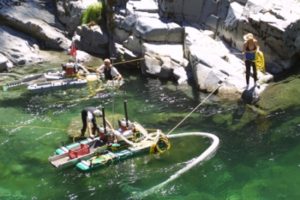California Supreme Court Upholds Suction Mining Moratorium
California Supreme Court Upholds Suction Mining Moratorium
On Monday, the California Supreme Court upheld California’s moratorium on suction dredging for gold. Suction dredging is a small-scale mining practice in which matter is removed from the bottom of waterways, minerals are extracted, and the residue is returned to the water. In 2009, the California state legislature imposed a temporary ban on the issuance of dredging permits due to concerns that suction dredging contributed to mercury contamination and disturbed endangered coho salmon habitat.
In 2012, Brandon Rinehart, a miner operating a mining claim he held on federal land, was criminally charged violating with the suction dredging ban. Rinehart argued that the moratorium was unenforceable because the federal Mining Law of 1872 and the Surface Resources and Multiple Use Act gave him the right to mine on federal land, and suction dredging was the only commercially practicable method for extracting gold from his claim. A California Court of Appeal reversed Rinehart’s conviction, finding that if the application of state law makes a mining claim commercially impracticable, the state law is preempted by federal mining law.
The California Supreme Court reversed the appeals court’s decision, finding that California’s moratorium was not preempted because the federal mining laws relied on by Rinehart “reflect a congressional intent to afford prospectors secure possession of…the places they mine,” but do not go further and guarantee prospectors “a right to mine immunized rom exercises of the states’ police powers.”

